- Home
- Gillian Flynn
Sharp Objects Page 8
Sharp Objects Read online
Page 8
“Camille? You’re here! I’m so happy to see you again, sweetie.” She seemed sincere. That Juicy Fruit smell wafted off her again.
“She’s been here for five minutes,” snapped another blonde, wiping the ice and water onto the floor with a swipe of her dark hand. Diamonds flashed from two fingers.
“Right, I remember. You’re here covering the murders, bad girl,” Jackie continued. “Adora must hate that. Sleeping in her house with your dirty little brain.” She smiled a smile that must have been saucy twenty years ago. Now it seemed slightly mad.
“Jackie!” said a blonde, aiming bright saucer eyes at her.
“’Course before Adora took it over, we all slept over at Joya’s house with our dirty little brains. Same house, different crazy lady running it,” she said to me, fingering the flesh behind her ears. Stitches from that facelift?
“You never knew your grandma Joya, did you, Camille?” purred Annabelle.
“Woo! She was a piece of work, sweetie,” said Jackie. “Scary, scary woman.”
“How so?” I asked. I’d never heard such detail about my grandmother. Adora allowed that she was strict, but said little else.
“Oh, Jackie’s exaggerating,” Annabelle said. “No one likes their mother when they’re in high school. And Joya was dead pretty soon after. They never really had time to establish an adult relationship.”
For a second I had a pitiful dash of hope, that this was why my mother and I were so distant: She had no practice. The idea was dead before Annabelle finished refilling my glass.
“Right, Annabelle,” Jackie said. “I’m sure if Joya were alive today, they’d have a grand old time. At least Joya would. She’d just love to tear at Camille. Remember those long, long nails of hers? Never painted them. I always thought that was weird.”
“Change of subject,” Annabelle smiled, each word like the tinkle of a silver dinner bell.
“I think Camille’s job must be so fascinating,” said one of the blondes dutifully.
“Especially this one,” said another.
“Yeah Camille, tell us who did it,” blurted Jackie. She smiled leeringly again and clicked her round brown eyes open and shut. She reminded me of a ventriloquist dummy come alive. With hard skin and broken capillaries.
I had a few calls to make, but decided this could be better. A quartet of drunk, bored, and bitchy housewives who knew all the gossip of Wind Gap? I could write it off as a business lunch.
“Actually I’d be interested to know what you all think.” A sentence they couldn’t hear very often.
Jackie dipped her bread into a side dish of ranch dressing, then dripped it down her front. “Well you all know what I think. Ann’s daddy, Bob Nash. He’s a pervert. He always stares at my chest when I see him at the store.”
“What chest there is,” said Annabelle, and nudged me jokingly.
“I’m serious, it’s out of line. I’ve been meaning to tell Steven about it.”
“I’ve got yummy news,” said the fourth blonde. Dana or Diana? I forgot it as soon as Annabelle introduced us.
“Oh, DeeAnna always has good scoop, Camille,” Annabelle said, squeezing my arm. DeeAnna paused for effect, licked her teeth, poured herself another glass of wine, and peeked over it at us.
“John Keene has moved out of his parents’ house,” she announced.
“What?” said a blonde.
“You are joooking,” said another.
“My word,” gushed a third.
“And…” said DeeAnna triumphantly, smiling like a game-show hostess about to bestow a prize. “Into Julie Wheeler’s home. The carriage house out back.”
“That is too good,” said Melissa or Melinda.
“Oh, you know they’re doing it now,” laughed Annabelle. “No way Meredith can keep her Little Miss Perfect thing going. See, Camille,” she turned to me, “John Keene is Natalie’s big brother, and when that family moved here, the whole town went loony for him. I mean, he’s gorgeous. He. Is. Gorgeous. Julie Wheeler, she’s a friend of your momma’s and ours. Didn’t have babies till she was, like, thirty, and when she did, she became just insufferable. One of those people whose kids can do no wrong. So when Meredith—her daughter—snagged John, oh my God. We thought we’d never hear the end of it. Meredith, this A-student little virgin girl gets the Big Man on Campus. But no way a boy like that, his age, goes with a girl who isn’t putting out. Just doesn’t work that way. And now, it’s so convenient for them. We should get Polaroids and stick them under Julie’s windshield wipers.”
“Well, you know how she’s playing it,” Jackie interrupted. “It’s going to be all about how good they are to take John in and give him a little breathing room while he mourns.”
“Why is he moving out, though?” asked Melissa/Melinda, who I was starting to think was the voice of reason. “I mean, shouldn’t he be with his folks at a time like this? Why would he need breathing room?”
“Because he’s the killer,” DeeAnna blurted, and the table began laughing.
“Oh, that would be so delicious if Meredith Wheeler were giving it to some serial killer,” Jackie said. Suddenly the table stopped laughing. Annabelle emitted a sneezy hiccup and looked at her watch. Jackie rested her chin on her hand, breathed out hard enough to bluster the bread crumbs on her plate.
“I can’t believe this is really happening,” said DeeAnna, looking down at her nails. “In our town, where we grew up. Those little girls. It makes me feel sick to my stomach. Just sick.”
“I’m so glad my girls are grown up,” Annabelle said. “I just don’t think I’d be able to take it. Poor Adora must be worried sick about Amma.”
I nabbed a piece of bread in the birdy, girlish way of my hostesses, and steered the conversation away from Adora. “Do people really think John Keene could have had anything to do with it? Or is that just mean gossip?” I could feel myself spitting out the last part. I’d forgotten how unlivable women like these could make Wind Gap for people they didn’t like. “I ask only because a group of girls, probably junior-high-schoolers, said the same thing to me yesterday.” I thought it best not to mention Amma was one of them.
“Let me guess, four little mouthy blonde things who think they’re prettier than they are,” Jackie said.
“Jackie, sweetheart, do you realize who you just said that to?” Melissa/Melinda said, slapping her hand on Jackie’s shoulder.
“Oh shit. I always forget Amma and Camille are even related—different lifetimes, you know?” Jackie smiled. A hearty pop sounded behind her and she lifted her wineglass without even looking at the waiter. “Camille, you might as well hear it here: Your little Amma is truuuuble.”
“I hear they come to all the high-school parties,” DeeAnna said. “And take all the boys. And do things we didn’t do till we were old married women—and then only after the transaction of a few nice pieces of jewelry.” She twirled a diamond tennis bracelet.
They all laughed; Jackie actually pounded the table with both fists like a toddler in a fit.
“But do…”
“I don’t know if people really think John did it. I know the police talked to him,” Annabelle said. “They’re definitely a strange family.”
“Oh, I thought you were close,” I said. “I saw you at their house after the funeral.” You fucking cunts, I added in my head.
“Everybody important in the town of Wind Gap was in that house after the funeral,” DeeAnna said. “Like we were going to miss a function like that.” She tried to start the laughter going again, but Jackie and Annabelle were nodding solemnly. Melissa/Melinda looked around the restaurant as if she could wish herself to another table.
“Where’s your momma?” Annabelle suddenly blurted. “She needs to come down here. Could do her good. She’s been acting so strange since this all started.”
“She was acting strange before this started, too,” Jackie said, working her jaw. I wondered if she was going to vomit.
“Oh please, Jackie.”
“I’m serious. Camille, let me say this: Right now, way things are with your mother, you’re better in Chicago. You should go back soon.” Her face had lost its manicness—she looked completely solemn. And genuinely concerned. I felt myself liking her again.
“Truly, Camille…”
“Jackie, shut up,” Annabelle said, and threw a roll, hard, at Jackie’s face. It bounced off her nose and thumped onto the table. A silly flash of violence, like when Dee threw his tennis ball at me—you’re less shocked by the impact than the fact it happened at all. Jackie registered the hit with a wave of her hand and kept talking.
“I’ll say what I please, and I’m saying, Adora can harm…”
Annabelle stood up and walked over to Jackie’s side, pulled her up by her arm.
“Jackie, you need to make yourself throw up,” she said. Her voice was a cross between a coo and a threat. “You’ve had too much to drink, and you’re going to feel real sick otherwise. Let me take you to the lady’s room and help make you feel better.”
Jackie smacked her hand away at first, but Annabelle’s grip tightened and the two soon tottered away. Silence at the table. My mouth hung open.
“That’s nothing,” DeeAnna said. “We old girls have little fights the same way you young girls do. So Camille, have you heard we might be getting a Gap?”
Jackie’s words stuck with me: Way things are with your mother, you’re better in Chicago. How much more of a sign did I need to leave Wind Gap? I wondered exactly why she and Adora had fallen out. Had to be more than a forgotten greeting card. I made a mental note to drop by Jackie’s when she was less looped. If she ever was. Then again, I was hardly the one to frown on a drinker.
Sailing on a nice wine buzz, I called the Nashes from the convenience store, and a quivering girl’s voice said hello and then went silent. I could hear breathing, but no answer to my requests to speak with Mom or Dad. Then a slow, sliding click before the line went dead. I decided to try my luck in person.
A boxy disco-era minivan sat in the Nash driveway next to a rusty yellow Trans Am, which I assumed meant both Bob and Betsy were home. The eldest daughter answered the bell, but simply stood inside the screen door staring at my stomach when I asked if her folks were home. The Nashes were built tiny. This one, Ashleigh, I knew was twelve, but like the pudgy boy I’d met on my first visit, she looked several years younger than her age. And acted it. She sucked on her hair and hardly blinked when little Bobby waddled next to her and began crying at the sight of me. Then howling. A good minute went by before Betsy Nash came to the door. She looked as dazed as both her children, and seemed confused when I introduced myself.
“Wind Gap don’t have a local daily paper,” she said.
“Right, I’m from the Chicago Daily Post,” I said. “Up in Chicago. Illinois.”
“Well, my husband deals with purchases like that,” she said, and began running her fingers through her son’s blond hair.
“I’m not selling a subscription or anything…. Is Mr. Nash home? Maybe I could just chat with him real quick?”
All three Nashes moved away from the door en masse, and after another few minutes, Bob Nash had me ushered inside and was throwing laundry off the couch to make room for me to sit.
“Goddammit, this place is a pit,” he muttered loudly toward his wife. “I apologize for the state of our home, Miss Preaker. Things have kinda gone to hell ever since Ann.”
“Oh, don’t worry about it at all,” I said, pulling a pair of tiny boys’ undies from beneath me. “This is what my place looks like all the time.” This was the opposite of true. One quality I did inherit from my mother was a compulsive neatness. I have to stop myself from ironing socks. When I got back from the hospital, I even went through a period of boiling things: tweezers and eyelash curlers, bobby pins and toothbrushes. It was an indulgence I allowed myself. I ended up trashing the tweezers, though. Too many late-night thoughts about their shiny, warm points. Dirty girl, indeed.
I was hoping Betsy Nash would disappear. Literally. She was so insubstantial, I could imagine her slowly evaporating, leaving only a sticky spot on the edge of the sofa. But she lingered, eyes darting between me and her husband before we even began speaking. Like she was winding up for the conversation. The children, too, hovered about, little blonde ghosts trapped in a limbo between indolence and stupidity. The pretty girl might do all right. But the piggy middle child, who now waddled dazedly into the room, was destined for needy sex and snack-cake bingeing. The boy was the type who’d end up drinking in gas-station parking lots. The kind of angry, bored kid I saw on my way into town.
“Mr. Nash, I need to speak some more with you about Ann. For a larger piece,” I started. “You’ve been very kind with your time, and I was hoping to get a little bit more.”
“Anything that might get this case a little attention, we don’t mind,” he said. “What do you need to know?”
“What kind of games did she like, what kind of foods did she like? What would be some words you’d use to describe her? Did she tend to be a ringleader or a follower? Did she have lots of friends or just a few close ones? How did she like school? What did she do on her Saturdays?” The Nashes stared at me in silence for a second. “Just for starters,” I smiled.
“My wife would be the one to answer most of those questions,” Bob Nash said. “She’s the…caregiver.” He turned to Betsy Nash, who was folding and refolding the same dress on her lap.
“She liked pizza and fishsticks,” she said. “And she had lots of girls she was friendly with, but only a few close friends, if you know what I mean. She played by herself a lot.”
“Look, Mommy, Barbie needs clothes,” said Ashleigh, wielding a naked plastic doll in front of her mother’s face. All three of us ignored her, and she tossed the toy to the floor and began twirling around the room in fake ballerina moves. Seeing a rare chance, Tiffanie pounced on the Barbie and began splaying the rubbery tan legs open and shut, open and shut.
“She was tough, she was my toughest,” Bob Nash said. “She could have played football if she’d been a boy. She’d knock herself silly just running around, always had scrapes and bruises.”
“Ann was my mouth,” Betsy said quietly. Then she said no more.
“How is that, Mrs. Nash?”
“She was a real talker, said whatever come into her mind. In a good way. Mostly.” She was silent again for a few beats, but I could see her thinking back behind her eyes so I said nothing. “You know, I thought maybe she’d be a lawyer or college debater or something someday, because she was just…she never stopped to measure her words. Like me. I think everything I say is stupid. Ann thought everyone should hear everything she had to say.”
“You mentioned school, Miss Preaker,” interrupted Bob Nash. “That’s where her talkativeness got her in trouble. She could be a little bossy, and we got a few calls from her teachers over the years about her not taking too well to class. She was a little wild.”
“But sometimes I think it was because she was just so smart,” added Betsy Nash.
“She was whip smart, yup,” Bob Nash nodded. “Sometimes I thought she was smarter than her old man. Sometimes she thought she was smarter than her old man.”
“Look at me, Mommy!” Piggy Tiffanie, who had been chewing mindlessly on Barbie’s toes, ran to the center of the living room and began doing somersaults. Ashleigh, seized by some phantom anger, yelped at the sight of her mother’s attention on the second daughter, and gave her a hard shove. Then yanked her hair emphatically once. Tiffanie’s face split in a red wail, which started Bobby Jr. crying again.
“It’s Tiffanie’s fault,” Ashleigh screamed, and began whimpering also.
I had shattered some delicate dynamic. A multichild household is a pit of petty jealousies, this I knew, and the Nash children were panicking at the idea of competing not just with one another, but with a dead sister. They had my sympathies.
“Betsy,” muttered Bob Nash quietly, eyebrows slightly raised. Bobb
y Jr. was quickly scooped up and propped on a hip, Tiffanie pulled up from the floor with one hand, another arm around the now inconsolable Ashleigh, and soon the four were moving out of the room.
Bob Nash stared after them a beat.
“Been like that for almost a year now, those girls,” he said. “Them acting like little babies. Thought they were supposed to be anxious to grow up. Ann being gone changes this home more than…” He shifted on the sofa. “It’s just that she was a real person, you know? You think: Nine years old, what’s that? What’s there? But Ann had a personality. I could guess what she’d think about things. I knew, when we were watching TV, what stuff she’d think was funny and what stuff she’d think was dumb. I can’t do that with my other kids. Hell, I can’t do that with my wife. Ann, you just felt her there. I just…” Bob Nash’s throat shut up on him. He stood and turned away from me, turned back once, then away, walked in a circle behind the couch, then stood in front of me. “Goddammit, I want her back. I mean, what now? Is this it?” He threw his hand around the room, toward the doorway where his wife and kids had exited. “Because if this is it, there ain’t much point is there? And goddammit, someone needs to find that man, because he needs to tell me: Why Ann? I need to know that. She was the one I’d always thought would do ok.”
I sat quiet for a second, could feel my pulse in my neck.
“Mr. Nash, it has been suggested to me that maybe Ann’s personality, which you mention was very strong, might have rubbed some people the wrong way. Do you think that could have anything to do with this?”
I could feel him get wary on me, see it in the way he sat down and deliberately leaned back onto the couch, spread his arms and pretended to be casual.
“Rubbed who the wrong way?”
“Well, I understand there were troubles about Ann and a neighbor’s bird? That she may have hurt a neighbor’s bird?”
Bob Nash rubbed his eyes, looked at his feet.
“God, people gossip in this town. No one ever proved Ann did that. She and the neighbors already had bad blood. Joe Duke across the way. His girls, they’re older, they messed with Ann a lot, teased her a lot. Then they have her over to play one day. I don’t really know what happened, but by the time Ann got back here, they were all screaming that she’d killed their goddam bird.” He laughed, shrugged his shoulders. “Be fine by me if she had, it was a noisy old thing.”
“Do you think Ann would be likely to do something like that, if provoked?”
“Well, it was a fool who provoked Ann,” he said. “She didn’t take that kind of thing well. She wasn’t exactly a little lady.”
“Do you think she knew the person who killed her?”
Nash picked up a pink T-shirt from the sofa, folded it in squares like a kerchief. “Used to think no. Now, I think yes. I think she went with someone she knew.”
“Would she be more likely to go with a man or a woman?” I asked.
“So you heard the James Capisi story?”
I nodded.
“Well, a little girl is more likely to trust a person who reminds her of her momma, right?”
Depends on what her momma’s like, I thought.
“But I still think it’s a man. Can’t picture a woman doing all…that to a baby. I hear John Keene has no alibi. Maybe he wanted to kill a little girl, saw Natalie all day every day, and couldn’t take it, the urge, so he went out and killed another little tomboy, girl kind of like Natalie. But then in the end he couldn’t resist, took Natalie too.”
“Is that the talk?” I asked.
“Some of it, I s’pose.”
Betsy Nash appeared suddenly in the doorway. Looking down at her knees, she said, “Bob. Adora is here.” My stomach clenched without my permission.
My mother breezed in, smelling like bright blue water. She looked more comfortable in the Nash house than Mrs. Nash did. It was a natural gift for Adora, making other women feel incidental. Betsy Nash retired from the room, like some maid from a 1930s movie. My mother refused to look at me, but went straight to Bob Nash.
“Bob, Betsy told me there was a reporter here, and I knew right then it was my daughter. I’m so sorry. I can’t apologize enough for the intrusion.”
Bob Nash stared at Adora, then at me. “This is your daughter? I had no idea.”
“No, probably not. Camille’s not the family type.”
“Why didn’t you say anything?” Nash asked me.
“I told you I was from Wind Gap. I had no idea you’d be interested in who my mother was.”
“Oh, I’m not angry, don’t get me wrong. It’s just that your mother is a very good friend to us,” he said, as if she were some big-hearted patron. “She tutored Ann in English and spelling. Your mother and Ann were very close. Ann was very proud she had an adult friend.”
My mother sat with her hands folded in her lap, skirt spread out along the couch, and blinked at me. I felt as if I were being warned not to say something, but I didn’t know what.
“I had no idea,” I finally said. True. I’d thought my mother was overplaying her mourning, pretending to know those girls. Now I was surprised at how subtle she’d been. But why in the world was she tutoring Ann? She’d done the mother’s-aide thing at my school when I was a kid—mainly to spend time with other Wind Gap housewives—but I couldn’t picture her noblesse oblige extending to spending afternoons with a unkempt girl from the west side of town. Occasionally I underestimated Adora. I suppose.
“Camille, I think you should leave,” Adora said. “I’m here on a social visit and it’s difficult for me to relax around you these days.”
“I’m not quite done talking with Mr. Nash.”
“Yes, you are.” Adora looked at Nash for confirmation, and he smiled awkwardly, like someone staring down the sun.

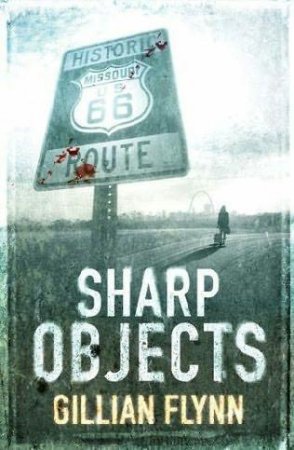 Sharp Objects
Sharp Objects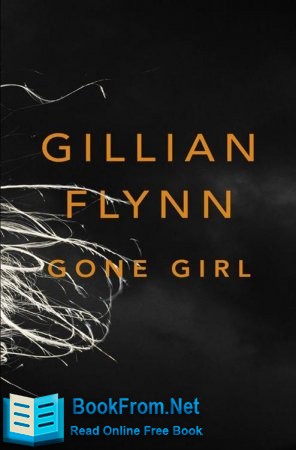 Gone Girl
Gone Girl Dark Places
Dark Places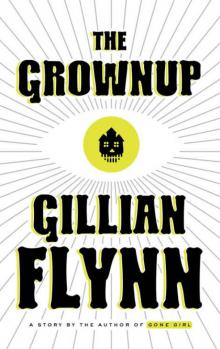 The Grownup
The Grownup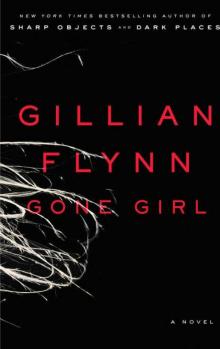 Gone Girl: A Novel
Gone Girl: A Novel The Complete Gillian Flynn
The Complete Gillian Flynn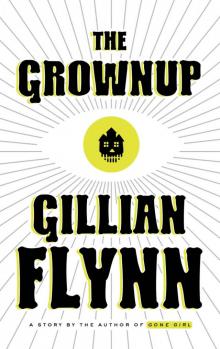 The Grownup: A Story by the Author of Gone Girl (Kindle Single)
The Grownup: A Story by the Author of Gone Girl (Kindle Single)